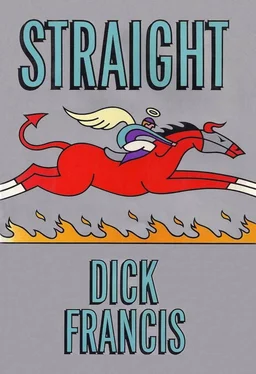My thanks especially to
JOSEPH and DANIELLE ZERGER
of ZARLENE IMPORTS
Dealers in semiprecious stones
and also to MARY BROMILEY — ankle specialist
BARRY PARK — veterinary surgeon
JEREMY THOMPSON — doctor, pharmacologist
ANDREW HEWSON — literary agent
and as always to
MERRICK and FELIX, our sons.
I inherited my brother’s life. Inherited his desk, his business, his gadgets, his enemies, his horses and his mistress. I inherited my brother’s life, and it nearly killed me.
I was thirty-four at the time and walking about on elbow crutches owing to a serious disagreement with the last fence in a steeplechase at Cheltenham. If you’ve never felt your ankle explode, don’t try it. As usual, it hadn’t been the high-speed tumble that had done the damage but the half-ton of one of the other runners coming over the fence after me, his forefoot landing squarely on my boot on the baked earth of an Indian summer. The hoof mark was imprinted on the leather. The doctor who cut the boot off handed it to me as a souvenir. Medical minds have a macabre sense of humor.
Two days after this occurrence, while I was reluctantly coming to terms with the fact that I was going to miss at least six weeks of the steeplechasing season and with them possibly my last chance of making it to champion again (the middle thirties being the beginning of the end for jump jockeys), I answered the telephone for about the tenth time that morning and found it was not another friend ringing to commiserate.
“Could I speak,” a female voice asked, “to Derek Franklin?”
“I’m Derek Franklin,” I said.
“Right.” She was both brisk and hesitant, and one could understand why. “We have you listed,” she said, “as your brother Greville’s next-of-kin.”
Those three words, I thought with an accelerating heart, must be among the most ominous in the language.
I said slowly, not wanting to know, “What’s happened?”
“I’m speaking from St. Catherine’s Hospital, Ipswich. Your brother is here, in the intensive care unit...”
At least he was alive, I thought numbly.
“... and the doctors think you should be told.”
“How is he?”
“I’m sorry. I haven’t seen him. This is the social worker. But I understand that his condition is very serious.”
“What’s the matter with him?”
“He was involved in an accident,” she said. “He has multiple injuries and is on life support.”
“I’ll come,” I said.
“Yes. It might be best.”
I thanked her, not knowing exactly what for, and put down the receiver, taking the shock physically in lightheadedness and a constricted throat.
He would be all right, I told myself. Intensive care meant simply that he was being carefully looked after. He would recover, of course.
I shut out the anxiety to work prosaically instead on the practicalities of getting from the town of Hungerford in Berkshire, where I lived, to Ipswich in Suffolk, about a hundred and fifty miles across country, with a crunched ankle. It was fortunately the left ankle, which meant I would soon be able to drive my automatic gears without trouble, but it was on that particular day at peak discomfort and even with painkillers and icepacks was hot, swollen and throbbing. I couldn’t move it without holding my breath, and that was partly my own fault.
Owing to my hatred — not to say phobia — about the damaging immobility of plaster of Paris, I had spent a good deal of the previous day persuading a long-suffering orthopedic surgeon to give me the support of a plain crepe bandage instead of imprisonment in a cast. He was himself a plate-and-screw man by preference but had grumbled as usual at my request. Such a bandage as I was demanding might be better in the end for one’s muscles, but it gave no protection against knocks, as he had reminded me on other occasions, and it would be more painful, he said.
“I’ll be racing much quicker with a bandage.”
“It’s time you stopped breaking your bones,” he said, giving in with a shrug and a sigh and obligingly winding the crepe on tightly. “One of these days you’ll crack something serious.”
“I don’t actually like breaking them.”
“At least I haven’t had to pin anything this time,” he said. “And you’re mad.”
“Yes. Thanks very much.”
“Go home and rest it. Give those ligaments a chance.”
The ligaments took their chance along the back seat of my car while Brad, an unemployed welder, drove it to Ipswich. Brad, taciturn and obstinate, was unemployed by habit and choice but made a scratchy living doing odd jobs in the neighborhood for anyone willing to endure his moods. As I much preferred his long silences to his infrequent conversation, we got along fine. He looked forty, hadn’t reached thirty, and lived with his mother.
He found St. Catherine’s Hospital without much trouble and at the door helped me out and handed me the crutches, saying he would park and wait inside in the reception area and I could take my time. He had waited for me similarly for hours the day before, expressing neither impatience nor sympathy but simply being restfully and neutrally morose.
The intensive care unit proved to be guarded by brisk nurses who looked at the crutches and said I’d come to the wrong department, but once I’d persuaded them of my identity they kitted me sympathetically with a mask and gown and let me in to see Greville.
I had vaguely expected Intensive Care to involve a lot of bright lights and clanging bustle, but I found that it didn’t, or at least not in that room in that hospital. The light was dim, the atmosphere peaceful, the noise level, once my ears adjusted to it, just above silence but lower than identification.
Greville lay alone in the room on a high bed with wires and tubes all over the place. He was naked except for a strip of sheeting lying loosely across his loins and they had shaved half the hair off his head. Other evidences of surgery marched like centipede tracks across his abdomen and down one thigh, and there were darkening bruises everywhere.
Behind his bed a bank of screens showed blank rectangular faces, as the information from the electrodes fed into other screens in a room directly outside. He didn’t need, they said, an attendant constantly with him, but they kept an eye on his reactions all the time.
He was unconscious, his face pale and calm, his head turned slightly toward the door as if expecting visitors. Decompression procedures had been performed on his skull, and that wound was covered by a large padded dressing which seemed more like a pillow to support him.
Greville Saxony Franklin, my brother. Nineteen years my senior: not expected to live. It had to be faced. To be accepted.
“Hi, guy,” I said.
It was an Americanism he himself used often, but it produced no response. I touched his hand, which was warm and relaxed, the nails, as always, clean and cared for. He had a pulse, he had circulation: his heart beat by electrical stimulus. Air went in and out of his lungs mechanically through a tube in his throat. Inside his head the synapses were shutting down. Where was his soul, I wondered: where was the intelligent, persistent, energetic spirit? Did he know that he was dying?
I didn’t want just to leave him. No one should die alone. I went outside and said so.
A doctor in a green overall replied that when all the remaining brain activity had ceased, they would ask my consent before switching off the machines. I was welcome to be with my brother at that crisis point as well as before. “But death,” he said austerely, “will be for him an infinitesimal process, not a definitive moment.” He paused. “There is a waiting room along the hall with coffee and things.”
Читать дальше












